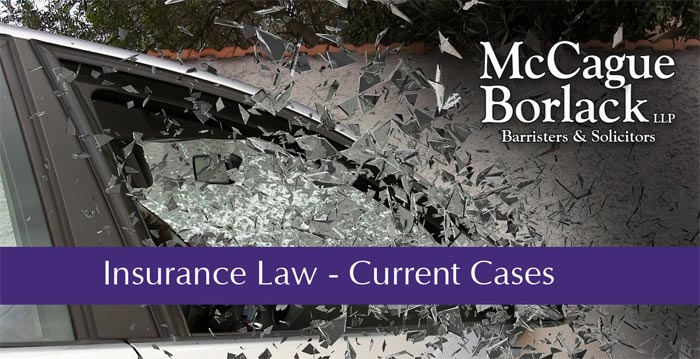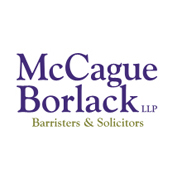by Petra Sbeiti
Introduction
In the recent decision of Aviva Insurance Company of Canada v. Spence, James Brown of McCague Borlack LLP, on behalf of the Appellant, argued successfully in front of the Divisional Court to have a License Appeal Tribunal (LAT) decision overturned. This LAT decision had found that EI sickness benefits (EI benefits) paid under the Employment Insurance Act (EIA) were not deductible from Income Replacement Benefits (IRB) under the Statutory Accident Benefits Schedule (SABS).
Background
On March 4, 2019, the Respondent was involved in a motor vehicle accident. As a result of the injuries sustained in the accident, the Respondent was unable to carry out her employment duties as a full-time registered nurse and received EI sickness benefits under EIA. The Respondent further claimed IRBs from her motor vehicle insurer, Aviva Insurance Company of Canada (Aviva). The parties agreed that the Respondent was entitled to receive IRBs during the 15-week period in dispute, however, disagreed over the total amount payable.
During the period in dispute, Aviva paid the IRBs but deducted 70% of the EI sickness benefits received by the Respondent post-accident as "gross employment income" pursuant to s.7(3) of the SABS. The Respondent disputed the deduction at the LAT, contending that EI sickness benefits should not be deducted from her IRB payments.
On February 16, 2021, the issue was brought before the LAT. After reviewing prior decisions involving maternity benefits, the Adjudicator held that the provisions in the SABS created ambiguity as to which types of EI payments should be considered in the calculation of IRBs. The Adjudicator agreed with the Respondent, that unlike EI maternity and unemployment benefits (which had previously been found deductible as gross employment income), the intention under the SABS was to treat EI sickness benefits differently. In rendering his decision, the Adjudicator held that since the SABS is a consumer protection regulation, the ambiguity should be resolved in favour of the Respondent, such that EI sick leave benefits are exempt from any deduction.
Aviva sought reconsideration of the decision on the basis that the Adjudicator had misinterpreted the SABS and created a distinction between EI sick leave benefits and all other forms of EI that did not exist. The request for reconsideration was denied by the same Adjudicator, leading Aviva to appeal to the Divisional Court.
The issue on appeal was whether the definition of "gross employment income" under the SABS includes EI sickness benefits... |
Issue
The issue on appeal was whether the definition of "gross employment income" under the SABS includes EI sickness benefits, such that 70% of the benefits would be deducted from IRB payments under s.7(3) of the SABS.
Relevant Analysis & Findings
On appeal, the Divisional Court overturned the LAT decision and found three errors in the Adjudicator's interpretation of the SABS.
- The Adjudicator first erred in finding conflict and ambiguity in the legislative wording of the SABS. The Court agreed with Aviva that, when read as a whole, the SABS provided specific instructions as to how EI benefits are to be treated for the purpose of calculating IRBs. In fact, excluding EI benefits from the definition of "other income replacement assistance" and "temporary disability benefit", made clear the legislative intent of treating all EI benefits as gross employment income.
As such, the Court concluded that the provisions of the SABS are in fact written in a clear and unambiguous language and stated that "[e]xcluding EI benefits from these definitions ensures that EI benefits which might otherwise meet the definitions are not deducted twice: once as gross employment income and again as either other income replacement assistance or as a temporary disability benefit." The Court further claimed that interpretation advanced by the Adjudicator would not achieve fairness but would result in the very inconsistency that the legislation intended to prevent – the double deduction from IRB payments.
- The second error was the Adjudicator's misinterpretation of s. 7(3), which states that insurers may deduct from IRB payments, 70% of any gross employment income received "as a result of being employed after the accident". In determining the Respondent's entitlement to IRBs, the Adjudicator wrongly equated the requirement of being employed with "actively working", and in turn, found that only post-accident income from active employment qualifies as income. The Court noted that, by definition, all EI benefits are paid "as a result of being employed" and should, therefore, be considered as income.
- The third error made by the Adjudicator was finding that the Respondent's EI payments were akin to temporary disability benefits. However, under the SABS, temporary disability benefits are paid for "an impairment that occurred before the accident". In the instant case, EI sickness benefits "were being paid in connection with the very accident with respect to which she had applied for IRBs".
Conclusion and Takeaway
With this decision, the Divisional Court has provided some much-needed clarification as to how EI benefits are to be treated under the SABS. This decision confirmed that the statutory wording and intent of the SABS, particularly with respect to the treatment of EI benefits, is consistent and coherent.
The decision also serves as a reminder that a motor vehicle insurer is intended to be the payor of last resort. While the SABS is consumer protection legislation and the purpose of income replacement benefits is to provide income protection to an injured person post-accident, that purpose does not overrule the other principles of motor vehicle insurance.
Download the full decision, Aviva Insurance Company of Canada v. Spence, 2022 ONSC 4988.



